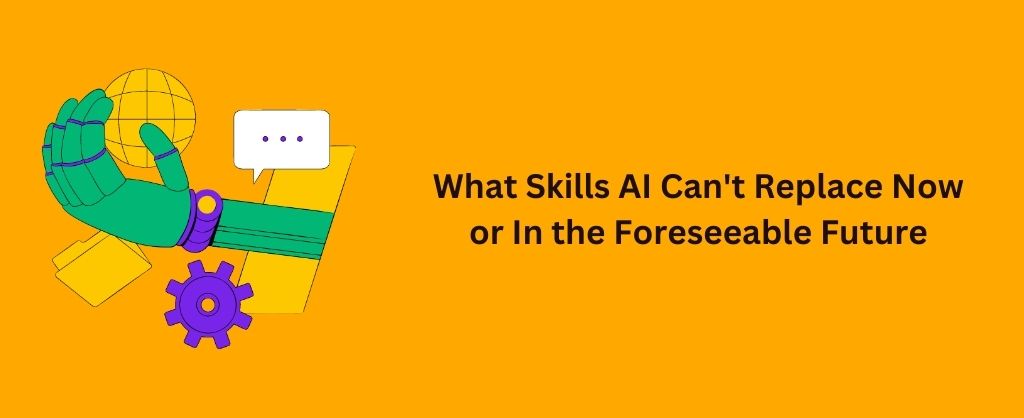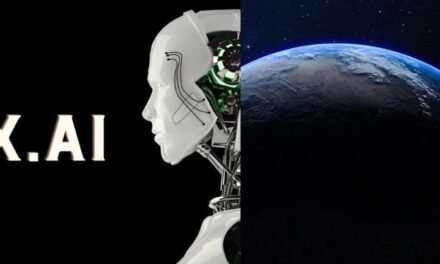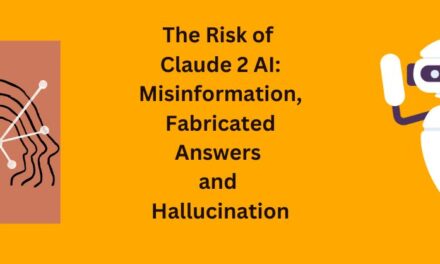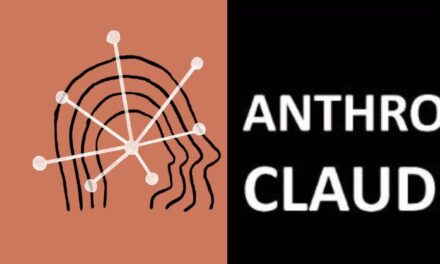What Skills AI Can’t Replace Now or In the Foreseeable Future

AI is getting crazy good these days. We keep hearing about how AI can write, talk, see, play games, and do all kinds of tasks. Makes you wonder – is there anything us humans can do that AI still can’t?
Turns out, there’s a lot! Our human abilities for creativity, emotions, wisdom, values, physical skills, and leadership are way beyond AI. Many important jobs need these totally human talents that no robot can replace.
Roles That Require Uniquely Human Skills and Judgment
Let’s chat about the special human skills AI lacks. Knowing this helps us have a real view of what AI can and can’t do.
More importantly, it shows how we can focus on our uniquely human gifts to thrive with AI as our buddy, not our replacement!
Creativity – The Human Spark
Our amazing creativity makes humans unique. Human innovation produces incredible art, writing, music, designs, and ideas that make life joyful. This creativity goes way beyond any AI.
AI uses patterns in data to mash up existing things into new combos. But real human creativity has true originality and vision AI can’t come close to.
For instance, an AI can study thousands of songs and generate new melodies. But it doesn’t have the genius of humans who made classics like Beethoven’s symphonies or Beyoncé’s hits. The most innovative companies know human creativity is one-of-a-kind.
Creative minds invent things no AI ever could.
Jobs needing mad creative imagination – like artists, writers, designers – can’t be replaced by AI. AI can help the creative process but can’t provide the human spark. Our creativity comes from the core of our humanity.
Social Smarts – The Human Touch
Humans are social creatures. We connect through emotional intelligence, humor, empathy – things that come naturally to us. AI still fumbles with the complex social abilities humans have mastered.
Machines have trouble really understanding human emotions, personalities, jokes, irony – all stuff humans instantly sense. AI can’t pick up on subtle social cues like eye contact, tone, sarcasm, and enthusiasm.
Jobs needing emotional engagement require human social smarts. Like therapists, doctors, teachers build rapport with people using empathy in sensitive situations.
A robot can’t console a grieving patient like a human can.
Humans also cooperate and chat in flexible ways AI struggles with. A good manager rallies their team through humor, personal understanding, inspiration – human talents no algorithm has. High-trust bonds between people happen thanks to our social gifts.
General Smarts – Human Instinct
Another perk humans have over AI is general intelligence. Our minds can reason, problem-solve, judge, and apply knowledge in all sorts of situations. Life experience gives us common sense and wisdom. This street smarts helps us figure things out using real-world know-how AI lacks.
Current AI is narrow – great at specific things it’s trained in, like chess or accounting. But it doesn’t have the broad thinking and context we develop over time. For example, a medical AI can diagnose illness expertly but can’t counsel a real patient the holistic way a seasoned doctor can.
Many jobs need sharp human thinking honed over years. Wise judges, researchers, analysts, strategists make sound judgments melding expertise with intuition no AI has yet. General intelligence makes humans flexible thinkers.
Ethics – The Human Factor
Humans have an inner sense of ethics, morals, justice – things that guide our choices. We make decisions weighing not just rules but also fairness, duty, human rights – moral intuition AI lacks. Our values come from lived experience.
Today’s AI uses cold logic and optimization to choose actions. But human choices involve prudence, compassion, and considering moral implications – which AI doesn’t compute.
We wouldn’t trust an AI to make judgments requiring ethical reasoning.
Many key roles need human discretion. Judges factor in fairness and intent when weighing cases. Policy makers use morals and wisdom to further just causes over convenient options. AI can assist, but for now, the human element is vital for moral choices.
Physical Skills – Human Agility
Humans are amazing at physical activities needing dexterity, coordination, perception – like sports, dancing, crafts. Our motor skills and hand-eye coordination leave robots in the dust.
Humans fluidly adapt to the physical world in ways rigid robots can’t. We have fine motor control and intuition to handle variation. Whether it’s surgery, manufacturing, or athletics, humans skillfully apply our physical gifts.
Jobs needing nimble versatility and skill will continue needing human talent. Like surgeons using refined dexterity for delicate operations. Or construction workers and firefighters using strength in highly unpredictable settings. The human body has physical gifts AI can’t physically duplicate.
Leadership – Human Vision
Humans are awesome at higher-level thinking like strategy, vision, risk analysis, and leadership. Leading people takes social intelligence, communication, intuition – human strengths.
AI can optimize data to improve specific outcomes really well. But human leadership goes way beyond cold optimization. Great leaders inspire through imagination, coalition building, politics, negotiation – talents no AI has mastered.
For example, no AI could rally people to transform an industry with disruptive innovations like Steve Jobs did.
Roles like executives, officials, community leaders need human strategic direction. Leading collective efforts depends on understanding psychology, communicating vision, coordinating people – things even the smartest AI can’t do yet.
Moving Forward with Our Humanity
Given how capable AI is, it’s easy to worry about being replaced by robots. But the reality is, we humans have irreplaceable creative, social, moral, strategic, and physical abilities AI lacks.
Rather than fretting, we should clearly see what AI can and can’t do. This lets us focus on growing our unique human gifts to thrive with AI’s help, not be replaced. If we want AI to enhance our world, not take it over, nurturing our humanity is key.
There are routine tasks AI will automate, sure. But roles needing creative imagination, emotional intelligence, ethics, dexterity, leadership and other human qualities are AI-proof.
The ideal future combines AI’s computing power with our social, moral, strategic human edge for an awesome partnership.
By lifelong learning, leading with vision, using wisdom, creativity, empathy – we can flourish with technology. The future belongs to those who embrace their fully human talents. Our humanity makes us indispensable.
Key Takeaways:
- Human creativity and innovation is one-of-a-kind – it can’t be replicated by AI. Creative jobs are safe from automation.
- Social intelligence, emotional engagement, rapport – uniquely human strengths – are beyond AI. People-centric jobs needing empathy are irreplaceable.
- General human intelligence, wisdom, real-world know-how exceed narrow AI. Many jobs require broad cognitive abilities AI lacks.
- Morality, values, ethics, justice – human faculties for reasoning – are superior to AI’s cold logic. Judgment roles need the human element.
- Physical dexterity, motor skills, hand-eye coordination – areas where humans excel AI – are key for many jobs.
- Strategic thinking, vision, leadership, team-building – quintessentially human qualities – are beyond AI. Management requires emotional intelligence.
Focusing on our creative, social, moral, physical, strategic humanity is the path to thrive with AI as a partner, not a replacement. Our human skills make us indispensable.













